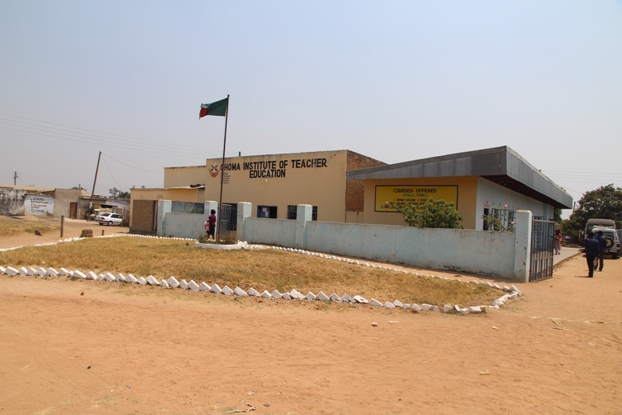CHOMA COUNCIL CLOSES 100 UNAUTHORIZED DRINKING PLACES
Notice: Undefined index: catFilterList in /home/zambi/public_html/wp-content/plugins/wp-likes/api.php on line 243

CHOMA Municipal Council has closed 100 Shebeens
CHOMA Municipal Council has closed 100 Shebeens that have been operating within residential areas of the
district.
Choma Municipal Council Health Committee Chairperson Flanery Musika stated that all the 100 Shebeens were closed during separate council operations in the first quarter of this year.
ZANIS reports that Mr. Musika disclosed during a full Council meeting that 12 people have been taken to court for illegal running of beer drinking places.
He noted that action to close illegal drinking places is meant to bring sanity to the district, adding that the
Council will continue to work towards this goal.
And Council Director of Health Paul Mukuka urged members of the public to report people that are
operating illegal beer businesses in residential areas so as to reduce the threat posed to the health of the community.
“These Shebeens pose a threat to humanity in that a toilet that is meant for a household is being used by a lot
of people. This risks an outbreak of many diseases,” he said.
Mr. Mukuka also observed that the Shebeens are also a hub of many illegal vices in communities.
At the same meeting, Mr. Mukuka said the Council together with the Ministry of Livestock will start to register dogs.
He disclosed that the exercise will allow the local authority to kill any unregistered stray dog starting in May next Month.
Shebeen
Shebeen in Joe Slovo Park, Cape Town
A shebeen (Irish: síbín) was originally an illicit bar or club where excisable alcoholic beverages were sold without a licence. The term has spread far from its origins in Ireland, to Canada, the United States, the United Kingdom, Zimbabwe, the English-speaking Caribbean,[1] Namibia, Malawi,[2] and South Africa. In modern South Africa, many shebeens are now fully legal.[3][4]
South Africa[edit]
Originally shebeens were operated illegally by women who were called Shebeen Queens and were themselves a revival of the African tradition that assigned the role of alcohol brewing to women.[5] The Shebeen Queens would sell homebrewed and home-distilled alcohol and provided patrons with a place to meet and discuss political and social issues. Often, patrons and owners were arrested by the police, though the shebeens were frequently reopened because of their importance in unifying the community and providing a safe place for discussion.[6] During the apartheid era, shebeens became a crucial meeting place for activists, some attracting working-class activists and community members, while others attracted lawyers, doctors and musicians.[7]
Shebeens also provided music and dancing, allowing patrons to express themselves culturally, which helped give rise and support the musical genre kwaito.[8] Currently, shebeens are legal in South Africa and have become an integral part of South African urban culture, serving commercial beers as well as umqombothi, a traditional African beer made from maize and sorghum. Shebeens still form an important part of today’s social scene. In contemporary South Africa, they serve a function similar to juke joints for African Americans in the rural Deep South of the USA. They represent a sense of community, identity, and belonging.
Today, most alcoholic beverages’ target market is the affluent black African class (particularly male), whose persona is perceived to be educated, tied to the high end job market and a step up in the social ladder. As well as appealing to South Africa’s youth, most shebeens are owned by black men. Shebeens are bouncing back as South Africans try to aspire to better economic conditions in order to preserve some of their cultural and economic affairs.[9]
United States[edit]
In the United States, the word shebeen saw general use by Irish immigrants who worked in the anthracite patches of Pennsylvania.[citation needed]
Newfoundland[edit]
Like many traditional Irish words, shebeen has persisted in Newfoundland. The Dictionary of Newfoundland English defines shebeen, also sheebeen and sheveen, as an “unlicensed place where illicit liquor is sold.” In the 1880s, the proliferation of shebeens was a hot topic, pitting temperance advocates against those who considered the shebeens harmless fun.
On January 5, 1888, the Twillingate Sun reported: “A policeman entered a shebeen and found a number of persons drinking. A panic ensued, and there was a general stampede. The transgressor of the law, on being brought before the magistrate, pleaded that he was merely entertaining a few friends. The Judge duly remarked he thought it a strange way to entertain friends, when the said friends tried to hide themselves and their drinking utensils away, on the approach of a constable.”
In April 1898, the Chief Steward of the S.S. Bruce raged in response to a St. John’s Evening Telegram story querying whether his ship was “a floating shebeen”.
- Bothy
- Cuca Shop – a similar establishment in Namibia
- List of public house topics
- Speakeasy
- Sly-grog shop (or shanty)
References
- ^ Sansone, Livio. The Making of Suriland, in Caribbean migration to Western Europe and the United States: essays on incorporation, identity, and citizenship, Temple University Press, 2009, ISBN 978-1-59213-954-5, p177
- ^ Mzungu, Watiposo (18 November 2016). “Can Malawi succeed in regulating sanitation in shebeens?”. The Nation. Nation Publications Limited. Retrieved 27 January 2019.
- ^ “The Citizen: Liquor stores to register as liquor distributors”. Archived from the original on 2009-04-09. Retrieved 2009-04-08.
- ^ “News – Finance/ Labour: Zoning could legalise Western Cape shebeens”. www.iol.co.za. Archived from the original on 2009-06-19.
- ^ Athol Fugard (5 August 1993). The Township Plays: No-Good Friday; Nongogo; The Coat; Sizwe Bansi is Dead; The Island. Oxford University Press. pp. 229–. ISBN 978-0-19-282925-2. Retrieved 9 September 2013.
- ^ Stanley-Niaah, Sonjah (2007). Katherine McKittnick and Clyde Woods (ed.). “Mapping of Black Atlantic Performance Geographies: From Slave Ship to Ghetto” Black Geographies and the Politics of Place. Cambridge: South End Press.
- ^ Vusi Mona. “Shebeens”. Archived from the original on August 10, 2007. Retrieved 2008-02-26.
- ^ Richard Poplak. “Words Are Weapons”. CBC News. Retrieved 2008-02-26.
- ^ Stanley-Niaah, Sonjah. “Mapping of Black Atlantic Performance Geographies: From Slave Ship to Ghetto.” In Black Geographies and the Politics of Place, ed. by Katherine McKittrick and Clyde Woods, 193–217. Cambridge, MA: South End Press, 2007
























